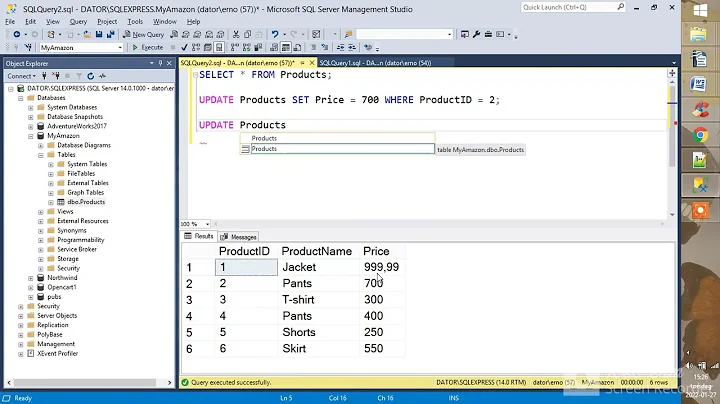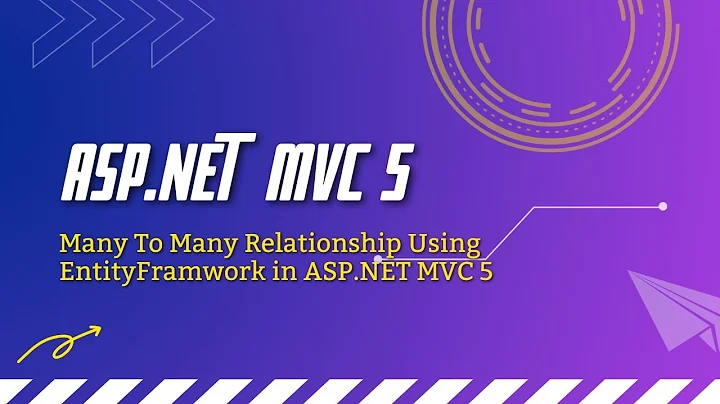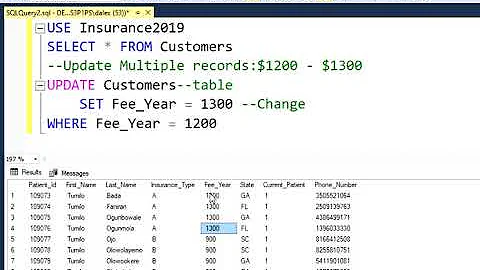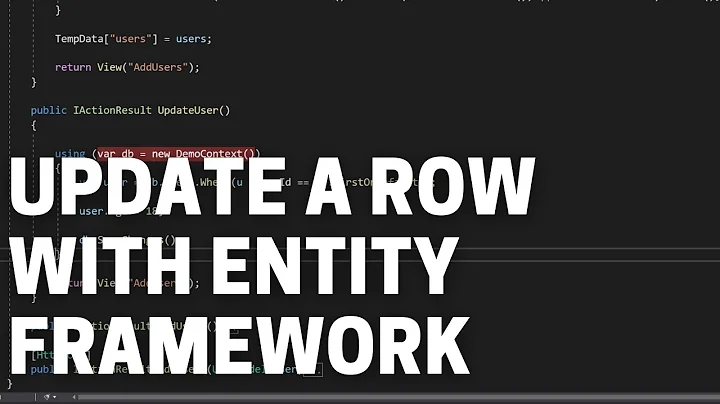Update Multiple Rows in Entity Framework from a list of ids
Solution 1
something like below
var idList=new int[]{1, 2, 3, 4};
using (var db=new SomeDatabaseContext())
{
var friends= db.Friends.Where(f=>idList.Contains(f.ID)).ToList();
friends.ForEach(a=>a.msgSentBy='1234');
db.SaveChanges();
}
UPDATE:
you can update multiple fields as below
friends.ForEach(a =>
{
a.property1 = value1;
a.property2 = value2;
});
Solution 2
var idList=new int[]{1, 2, 3, 4};
var friendsToUpdate = await Context.Friends.Where(f =>
idList.Contains(f.Id).ToListAsync();
foreach(var item in previousEReceipts)
{
item.msgSentBy = "1234";
}
You can use foreach to update each element that meets your condition.
Here is an example in a more generic way:
var itemsToUpdate = await Context.friends.Where(f => f.Id == <someCondition>).ToListAsync();
foreach(var item in itemsToUpdate)
{
item.property = updatedValue;
}
Context.SaveChanges()
In general you will most probably use async methods with await for db queries.
Solution 3
I have created a library to batch delete or update records with a round trip on EF Core 5.
Sample code as follows:
await ctx.DeleteRangeAsync(b => b.Price > n || b.AuthorName == "zack yang");
await ctx.BatchUpdate()
.Set(b => b.Price, b => b.Price + 3)
.Set(b=>b.AuthorName,b=>b.Title.Substring(3,2)+b.AuthorName.ToUpper())
.Set(b => b.PubTime, b => DateTime.Now)
.Where(b => b.Id > n || b.AuthorName.StartsWith("Zack"))
.ExecuteAsync();
Github repository: https://github.com/yangzhongke/Zack.EFCore.Batch Report: https://www.reddit.com/r/dotnetcore/comments/k1esra/how_to_batch_delete_or_update_in_entity_framework/
Solution 4
The IQueryable.ToQueryString method introduced in Entity Framework Core 5.0 may help with this scenario, if you are willing to have some raw SQL appearing in your code. This method will generate SQL that can be included in a raw SQL query to perform a bulk update of records identified by that query.
For example:
using var context = new DbContext();
var ids = new List<int>() { 1, 2, 3, 4 };
var query = context.Friends.Where(_ => ids.Contains(_.id)).Select(_ => _.id);
var sql = $"UPDATE Friends SET msgSentBy = {{0}} WHERE id IN ({query.ToQueryString()})";
context.Database.ExecuteSqlRaw(sql, "1234");
The major drawback of this approach is the use of raw SQL. However I don't know of any reasonable way to avoid that with current Entity Framework Core capabilities - you're stuck with this caveat, or the caveats of other answers posted here such as:
- Introducing a dependency on another library like https://github.com/yangzhongke/Zack.EFCore.Batch.
- Using
DbContext.SaveChanges()which will update records one at a time rather than doing a bulk update.
If (when) the following issue is addressed in the future then we are likely to get a better answer here: Bulk (i.e. set-based) CUD operations (without loading data into memory) #795
Related videos on Youtube
allencoded
Updated on October 07, 2021Comments
-
allencoded over 2 years
I am trying to create a query for entity framework that will allow me to take a list of ids and update a field associated with them.
Example in SQL:
UPDATE Friends SET msgSentBy = '1234' WHERE id IN (1, 2, 3, 4)How do I convert the above into entity framework?
-
 z atef over 10 yearsWhat is your database platform Oracle mysql ..
z atef over 10 yearsWhat is your database platform Oracle mysql .. -
allencoded over 10 yearsMy database is Microsoft SQL
-
Peter Kerr almost 9 yearsThere are two open source projects allowing this: EntityFramework.Extended and Entity Framework Extensions.
-
Gert Arnold over 3 yearsThe only correct answer to this is: you can't. Sure, you can pull all matching
Friends from the database and update their propertymsgSentByand save changes. But EF will fireUPDATEstatements for each individual record. That's not at all the same as a one-statement bulk update. As said, look for a third-party library that offers bulk update. -
Peter Kerr almost 3 years@SamuelLiew why move my answer to a comment, it is an answer and a useful one at that?
-
-
allencoded over 10 yearscan i update more than one field in the foreach above you did just sent by which is exactly what i asked for. just curious if you could do more? Also doesn't look like SubmitChanges quite works anymore. I am using the latest entity framework. Maybe SaveChanges()?
-
 BlueRaja - Danny Pflughoeft about 9 years
BlueRaja - Danny Pflughoeft about 9 yearsForEachis a method onList, and it's generally discouraged to use because it's not a very functional-way of programming. Just useforeach(the operator). -
 RamNow over 8 yearsUsing this solution generates one update query for each element in the list. Is there a way to get EF to do just one query like in the question? (
RamNow over 8 yearsUsing this solution generates one update query for each element in the list. Is there a way to get EF to do just one query like in the question? (UPDATE SomeTable SET SomeField = SomeValue WHERE Id IN (...)) -
 d512 over 8 yearsBe aware that this is a pretty inefficient way to go about this from a database perspective. Not only does this issue a big select statement involving every row from the Friends table, but it issues a separate UPDATE command for every record that is updated. So rather than issuing one command you are issues potentially many many commands as well as streaming a bunch of data out of your database.
d512 over 8 yearsBe aware that this is a pretty inefficient way to go about this from a database perspective. Not only does this issue a big select statement involving every row from the Friends table, but it issues a separate UPDATE command for every record that is updated. So rather than issuing one command you are issues potentially many many commands as well as streaming a bunch of data out of your database. -
 Shekhar Pankaj over 7 years@user1334007 any solution to avoid this?
Shekhar Pankaj over 7 years@user1334007 any solution to avoid this? -
 d512 over 7 years@ShekharPankaj, basically what you want to do is issue a SQL command like "UPDATE Friends SET msgSentBy = '1234' WHERE ID IN (1, 2, 3, 4)". I don't think that EF has direct support for doing that. I believe there are some 3rd party solutions to this (stackoverflow.com/questions/12751258/batch-update-delete-ef5) but I haven't used them. The other options is to use raw ADO.NET instead of EF.
d512 over 7 years@ShekharPankaj, basically what you want to do is issue a SQL command like "UPDATE Friends SET msgSentBy = '1234' WHERE ID IN (1, 2, 3, 4)". I don't think that EF has direct support for doing that. I believe there are some 3rd party solutions to this (stackoverflow.com/questions/12751258/batch-update-delete-ef5) but I haven't used them. The other options is to use raw ADO.NET instead of EF. -
 Mansur about 4 yearsThis is also getting the data first from the DB. Is there anything else that we can use without getting the data first?
Mansur about 4 yearsThis is also getting the data first from the DB. Is there anything else that we can use without getting the data first? -
Gert Arnold over 3 yearsI don't see how this adds anything to the existing answer. It basically just repeats it.
-
 Raphael Pinel over 3 yearsthe main difference is to use foreach instead of friends.ForEach
Raphael Pinel over 3 yearsthe main difference is to use foreach instead of friends.ForEach -
kiml42 over 3 yearsThe problem with this answer is it will read all the friends out of the DB into memory, alter them and then save them again, rather than executing a single update query in SQL to the DB.
-
barnacle.m over 3 yearsThis should NOT be the accepted answer, it's pretty inefficient and will cause the db to run out of memory pretty fast,
-
Gert Arnold about 3 yearsforeach instead of friends.ForEach That's totally irrelevant.









